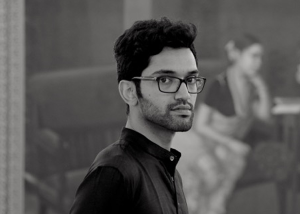Manu S Pillai is the shortlisted author of First International Young Author Awards. He is the author of the award-winning The Ivory Throne: Chronicles of the House of Travancore (HarperCollins). Formerly Chief of Staff to Dr Shashi Tharoor MP, he's worked at the House of Lords in Britain and with the BBC on their Incarnations Indian history series. Written over six years and researched in three continents, The Ivory Throne is Manu’s first book and tells a social and political history of Kerala through the life and times of Sethu Lakshmi Bayi, the last female Maharajah of Travancore. The book won the 2016 Tata Lit Live Prize for best first book of non fiction, and the 2017 Sahitya Akademi Yuva Puraskar. Manu is also text contributor to Serena Chopra's Bhutan Echoes (Tasveer, 2016), and a columnist for Mint Lounge. His writing has also appeared in The Hindu, Open Magazine, and other publications.
At the outset, congratulations for being shortlisted for the First International Young Author Awards for traditionally published Authors and welcome for a quick chat for our writer’s portal.
Manu : My sister introduced me to reading on a sustained basis when I was about nine or ten, and by my early teens I was writing some (terrible) poetry. I remember doing a “fantasy” novel and inflicting it in my family when I was around twelve, and a couple of short stories when I was still in school. But it took me some more years, till I was about nineteen or twenty, to really start writing in a serious, intelligent fashion. That is what culminated in my first book six years later.
Manu : Yes, The Ivory Throne is my first published work.
Manu : I have a book scheduled for publication in June. It is a history of the Deccan in India, from the thirteenth century till the early eighteenth, at a time when the region was a fascinating landscape featuring princes of Persian origins, warlords from Africa, and a magnet for ideas from around the world, all of which left a mark on Indian culture and India’s evolution as a society and people.
Manu : It was quite simple actually. Once I finished putting together most of my manuscript at the end of 2014, I wrote to VK Karthika, who was then publisher at HarperCollins India, with a few pages of my introductory chapter. The next morning I had a response, asking me to send in the rest of my manuscript. Eleven months later, during which I continued to tinker with the text a great deal, the book was in stores.
Manu : The process is simple—write, write, write, and don’t get distracted! As for the occasional “block”, taking a long-ish break and then returning to my writing ordinarily works for me. I also tend to reward myself in small ways when I achieve self-set goals. This works as adequate motivation where I am concerned. Besides, not writing is not an option.
Manu : I read a great deal of narrative non-fiction because my writing, at the moment, is all non-fiction. In terms of favourites, there are far too many to name and I really cannot think of one that triumphs over others. At the moment I am reading Lyndal Roper’s Martin Luther: Renegade and Prophet.
Manu : An excellent initiative—I welcome all efforts to support and promote writers!
Manu : Plain water. I drink bucketsful every day.
Manu : Quality is paramount. A badly, hastily written book never goes away, and will haunt you forever. So it is better to really invest time and produce something that you can be proud of for the rest of your life, and something that makes a real contribution to the world of the arts.
Manu : I am thankful for the nomination, and hope the Awards become an avenue for young creative minds to meet, to grow, and to exchange ideas as well as good writing.
